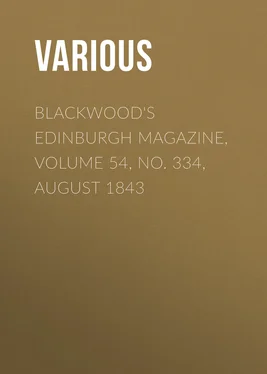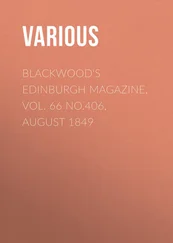Various - Blackwood's Edinburgh Magazine, Volume 54, No. 334, August 1843
Здесь есть возможность читать онлайн «Various - Blackwood's Edinburgh Magazine, Volume 54, No. 334, August 1843» — ознакомительный отрывок электронной книги совершенно бесплатно, а после прочтения отрывка купить полную версию. В некоторых случаях можно слушать аудио, скачать через торрент в формате fb2 и присутствует краткое содержание. Издательство: Иностранный паблик, Жанр: foreign_antique, periodic, foreign_edu, на английском языке. Описание произведения, (предисловие) а так же отзывы посетителей доступны на портале библиотеки ЛибКат.
- Название:Blackwood's Edinburgh Magazine, Volume 54, No. 334, August 1843
- Автор:
- Издательство:Иностранный паблик
- Жанр:
- Год:неизвестен
- ISBN:нет данных
- Рейтинг книги:5 / 5. Голосов: 1
-
Избранное:Добавить в избранное
- Отзывы:
-
Ваша оценка:
- 100
- 1
- 2
- 3
- 4
- 5
Blackwood's Edinburgh Magazine, Volume 54, No. 334, August 1843: краткое содержание, описание и аннотация
Предлагаем к чтению аннотацию, описание, краткое содержание или предисловие (зависит от того, что написал сам автор книги «Blackwood's Edinburgh Magazine, Volume 54, No. 334, August 1843»). Если вы не нашли необходимую информацию о книге — напишите в комментариях, мы постараемся отыскать её.
Blackwood's Edinburgh Magazine, Volume 54, No. 334, August 1843 — читать онлайн ознакомительный отрывок
Ниже представлен текст книги, разбитый по страницам. Система сохранения места последней прочитанной страницы, позволяет с удобством читать онлайн бесплатно книгу «Blackwood's Edinburgh Magazine, Volume 54, No. 334, August 1843», без необходимости каждый раз заново искать на чём Вы остановились. Поставьте закладку, и сможете в любой момент перейти на страницу, на которой закончили чтение.
Интервал:
Закладка:
Every one who knows Oxford, and a good many besides, must have heard of certain periodical migrations of the younger members of that learned university into distant and retired parts of her Majesty's dominions, which (on the "lucus à non lucendo" principle) are called and known by the name of Reading Parties. Some half dozen under-graduates, in peril of the coming examination, form themselves into a joint-stock cramming company; take L.30 or L.40 shares in a private tutor; pitch their camp in some Dan or Beersheba which has a reputation for dulness; and, like other joint-stock companies, humbug the public, and sometimes themselves, into the belief that they are "doing business." For these classical bubbles, the long vacation is the usual season, and Wales one of the favourite localities; and certainly, putting "Reading" out of the question, three fine summer months might be worse spent, than in climbing the mountains, and whipping the trout-streams, of that romantic land. Many a quiet sea-side town, or picturesque fishing-village, might be mentioned, which owes no little of its summer gayety, and perhaps something of its prosperity, to the annual visit of "the Oxonians:" many a fair girl has been indebted for the most piquant flirtation of the season to the "gens togata," who were reading at the little watering-place to which fate and papa had carried her for the race-week, or the hunt ball: and whatever the effect of these voluntary rustications upon the class lists in Oxford, they certainly have procured for the parties occasionally a very high "provincial celebrity." I know that when we beat our retreat from summer quarters at Glyndewi in 18—, the sighs of our late partners were positively heart-rending, and the blank faces of the deserted billiard-marker and solitary livery-stable 'groom' haunt me to this day.
I had been endeavouring by hard reading, for the last three months, to work up the arrears of three years of college idleness, when my evil genius himself, in the likeness of George Gordon of Trinity, persuaded me to put the finishing touch to my education, by joining a party who were going down to Glyndewi in –shire, "really to read." In an unguarded moment, I consented; packed up books enough to last me for five years, reading at the rate of twenty-four hours per day, wrote to the governor announcing my virtuous intention, and was formally introduced to the Rev. Mr Hanmer, Gordon's tutor, as one of his "cubs" for the long vacation.
Six of us there were to be; a very mixed party, and not well mixed—a social chaos. We had an exquisite from St Mary Hall, a pea-coated Brazenose boatman, a philosophical water-drinker and union-debater from Balliol, and a two bottle man from Christ Church. When we first met, it was like oil and water; it seemed as if we might be churned together for a century, and never coalesce: but in time, like punch-making, it turned out that the very heterogeneousness of the ingredients was the zest of the compound.
I had never heard of such a place as Glyndewi, nor had I an idea how to get there. Gordon and Hanmer were gone already; so I packed myself on the top of the Shrewsbury mail, as the direct communication between Oxford and North Wales, and there became acquainted with No. 2 of my fellows in transportation; (for, except Gordon and myself, we were all utter strangers to each other.) "I say, Hawkins; let's feel those ribbons a bit, will you?" quoth the occupant of the box-seat to our respectable Jehu. "Can't indeed, sir, with these hosses; it's as much as ever I can do to hold this here near leader." This was satisfactory; risking one's neck in a tandem was all very well—a part of the regular course of an Oxford education; but amateur drivers of stage coaches I had always a prejudice against: let gentlemen keep their own four-in-hands, and upset themselves and families, as they have an undeniable right to do—but not the public. I looked at the first speaker: at his pea-jacket, that is, which was all I could see of him: Oxford decidedly. His cigar was Oxford too, by the villanous smell of it. He took the coachman's implied distrust of his professional experience good-humouredly enough, proffered him his cigar-case, and entered into a discussion on the near-leader's moral and physical qualities. "I'll trouble you for a light, if you please," said I; he turned round, we stuck the ends of our cigars together, and puffed into each other's faces for about a minute, (my cigars were damp-ish,) as grave as North American Indians. "Thank you," said I, as the interesting ceremony was concluded, and our acquaintance begun. We got into conversation, when it appeared that he, too, was bound for the undiscovered shores of Glyndewi, and that we were therefore likely to be companions for the next three months. He was an off-hand, good-humoured fellow; drank brandy and water, treated the coachman, and professed an acquaintance with bar-maids in general, and pretty ones in particular, on our line of road. He was going up for a class, he supposed, he said; the governor had taken a "second below the line" himself, and insisted upon his emulating the paternal distinction; d–d nonsense, he said, in his opinion; except that the governor had a couple of harriers with Greek names, he did not see that his classics were of any use to him: and no doubt but that Hylax and Phryne would run just as well if they had been called Stormer and Merry Lass. However, he must rub up all his old Eton books this 'long,' and get old Hanmer to lay it on thick. Such was Mr Branling of Brazenose.
At Shrewsbury, we were saluted with the intelligence, "Coach dines here, gentlemen." We found a couple of fowls that the coach might probably have dined upon, and digested with other articles—in the hind boot; to human stomachs they seemed impracticable. We employed the allotted ten minutes upon a leg of mutton, and ascended again to our stations on the roof: and here was an addition to our party. Externally, it consisted of a mackintosh and a fur cap: in the very short interval between the turned-down flap of the one and the turned-up collar of the other, were a pair of grey-glass spectacles, and part of a nose. So far we had no very sufficient premises from which to draw conclusions, whether or not he were "one of us." But there were internal evidences; an odour of Bouquet de Roi or some such villanous compound nearly overpowering the fragrance of some genuine weed which I had supplied my pea-coated friend with in the place of his Oxford "Havannahs"—a short cough occasionally, as though the smoke of the said weed were not altogether "the perfume of the lip he loved;"—and a resolute taciturnity. What was he? It is a lamentable fact that an Oxford under-graduate does not invariably look the gentleman. He vibrates between the fashionable assurance of a London swindler, and the modest diffidence of an overgrown schoolboy. There is usually a degree of unfinishedness about him. He seems to be assuming a character unlike the glorious Burschenschaf of Germany, he has no character of his own. However, for want of more profitable occupation, we set to work in earnest to discover who our fellow traveller really was: and by a series of somewhat American conversational enquiries, we at last fished out that he was going into –shire like ourselves—nay, in answer to a direct question on the subject, that he hopes to meet Hanmer of Trinity at Glyndewi. But no further information could we get: our new friend was reserved. Mr Branling and I had commenced intimacy already. "My name is Branling of Brazenose;" "and mine Hawthorne of –;" was our concise introduction. But our companion was the pink of Oxford correctness on this point. He thanked the porter for putting his luggage up called me "Sir" till he found I was an Oxford man; and had we travelled for a month together, would rather have requested the coachman to introduce us, than be guilty of any such barbarism as to introduce himself. So by degrees our intimacy, instead of warming, waxed cold. As night drew on, and the fire of cigars from Branling, self, and coachman, became more deadly, the fur cap was drawn still closer over the ears, the mackintosh crept up higher, and we lost sight of all but the outline of the spectacles.
Читать дальшеИнтервал:
Закладка:
Похожие книги на «Blackwood's Edinburgh Magazine, Volume 54, No. 334, August 1843»
Представляем Вашему вниманию похожие книги на «Blackwood's Edinburgh Magazine, Volume 54, No. 334, August 1843» списком для выбора. Мы отобрали схожую по названию и смыслу литературу в надежде предоставить читателям больше вариантов отыскать новые, интересные, ещё непрочитанные произведения.
Обсуждение, отзывы о книге «Blackwood's Edinburgh Magazine, Volume 54, No. 334, August 1843» и просто собственные мнения читателей. Оставьте ваши комментарии, напишите, что Вы думаете о произведении, его смысле или главных героях. Укажите что конкретно понравилось, а что нет, и почему Вы так считаете.












